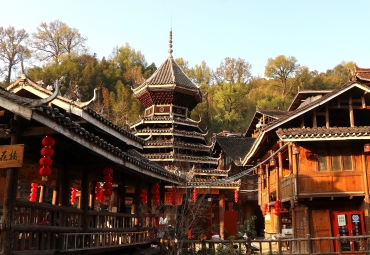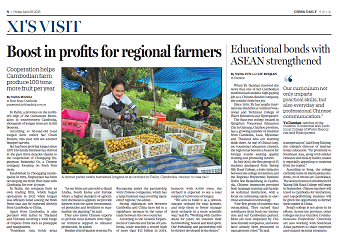Coal-gobbling city preparing to shed black and wear green

Employees check production at a smart facility of an aluminum product company in Liupanshui, Guizhou province. [Photo provided to China Daily]
Liupanshui in Guizhou province pursues industrial transformation for new life
More supportive policies can help Liupanshui in Guizhou province better transit from a coal-gobbling city to a local economy supported by more environmentally friendly enterprises, its top official said.
Li Gang, mayor of Liupanshui and a deputy to the 13th National People's Congress, called for more financial support from the National Development and Reform Commission within the central budget on investment.
Li said the larger goal is to promote green transformation of traditional industries and speed up development of new industrial clusters for more sustainable development in the city.
Li said: "Liupanshui will step up efforts in green transformation of traditional industries. Coal has been a pillar industry in Liupanshui's economic development. The city will continue its efforts in offering financial support to coal companies for technology innovation to cut emissions and improve efficiency.
"The local government will also encourage coal mines to adopt mechanization and intelligent transformation, and promote development of coal-related industries to extend the supply chain.
"Liupanshui will also speed up development of new industrial clusters to diversify energy sources and explore the new path of green and low-carbon development in the city. The focus will be on areas of new energy like lithium and hydrogen power, and emerging industries like new materials, the internet of things, and modern logistics. That's the way to promote Liupanshui's development of new industrial clusters."
Li's call for green transformation of Liupanshui's pillar industries is in line with the central government's strong green commitment.
While delivering the annual Government Work Report to the 13th National People's Congress on Friday, Premier Li Keqiang said China plans to reduce carbon dioxide emissions per unit of GDP by 18 percent during the 14th Five-Year Plan period (2021-25).
The carbon intensity target reaffirmed China's strong green commitment. Last year, China pledged to peak carbon emissions by 2030, and reach carbon neutrality by 2060.
Liupanshui's long-standing reliance on coal has defined its economy so far. According to the local government, proven coal reserves in Liupanshui reached 23.32 billion metric tons.
Last year, total profit from the city's coal mining and washing sector reached 2.98 billion yuan ($458.7 million), up 495 percent compared with 2015.
Tax revenues from coal mining and thermal power electricity generation surpassed 3.67 billion yuan, contributing more than 30 percent of the city's total.
"Coal, together with electricity, steel and construction materials, contributed about 85 percent of the added value of industries whose revenue from main businesses exceeded 20 million yuan each," Li said.
The city figures among the second batch of demonstration areas identified for industrial transition and upgrade by the NDRC and four other ministry-level departments in 2019.
Following their guidelines, the municipal government of Liupanshui invested 53.04 billion yuan in 183 projects in areas of public infrastructure, public service platforms, and industrial innovation.
This was to support development of industries like new materials, new energy, modern logistics, and the internet of things.
Thanks to persistent efforts in promoting sustainable development, the city has been able to reach certain milestones in the green transformation of traditional sectors and development of emerging industries.
Two Liupanshui-based coal mines-Faer coal mine and Shanjiaoshu coal mine-have been included in China's first batch of showpiece coal mines that underwent transformation to emerge as intelligent or smart enterprises.
The city's first route of hydrogen-powered buses, which is also the first such attempt in Guizhou, has been put into operation on March 5.
The city's hydrogen production plant and hydrogen refueling station have also started trial operations.
In addition, Liupanshui tied up with a team of hydrogen experts from top institutions such as the Chinese Academy of Sciences, Tsinghua University and the China University of Geosciences on technology innovation.
The team now offers technology support, guidance and consulting services to hydrogen-powered projects in the city.
Wang Jin contributed to this story.
All rights Reserved. 京ICP备13028878号-8







 Overview
Overview Guiyang
Guiyang Guian New Area
Guian New Area Liupanshui
Liupanshui Anshun
Anshun Qianxinan
Qianxinan Qiandongnan
Qiandongnan Qiannan
Qiannan Zunyi
Zunyi Tongren
Tongren Bijie
Bijie Guizhou commits to culture preservation and rural vitalization
Guizhou commits to culture preservation and rural vitalization Guizhou voice at 2025 national two sessions
Guizhou voice at 2025 national two sessions Meet the 'genius moms' at Shenzhen cultural fair
Meet the 'genius moms' at Shenzhen cultural fair 

